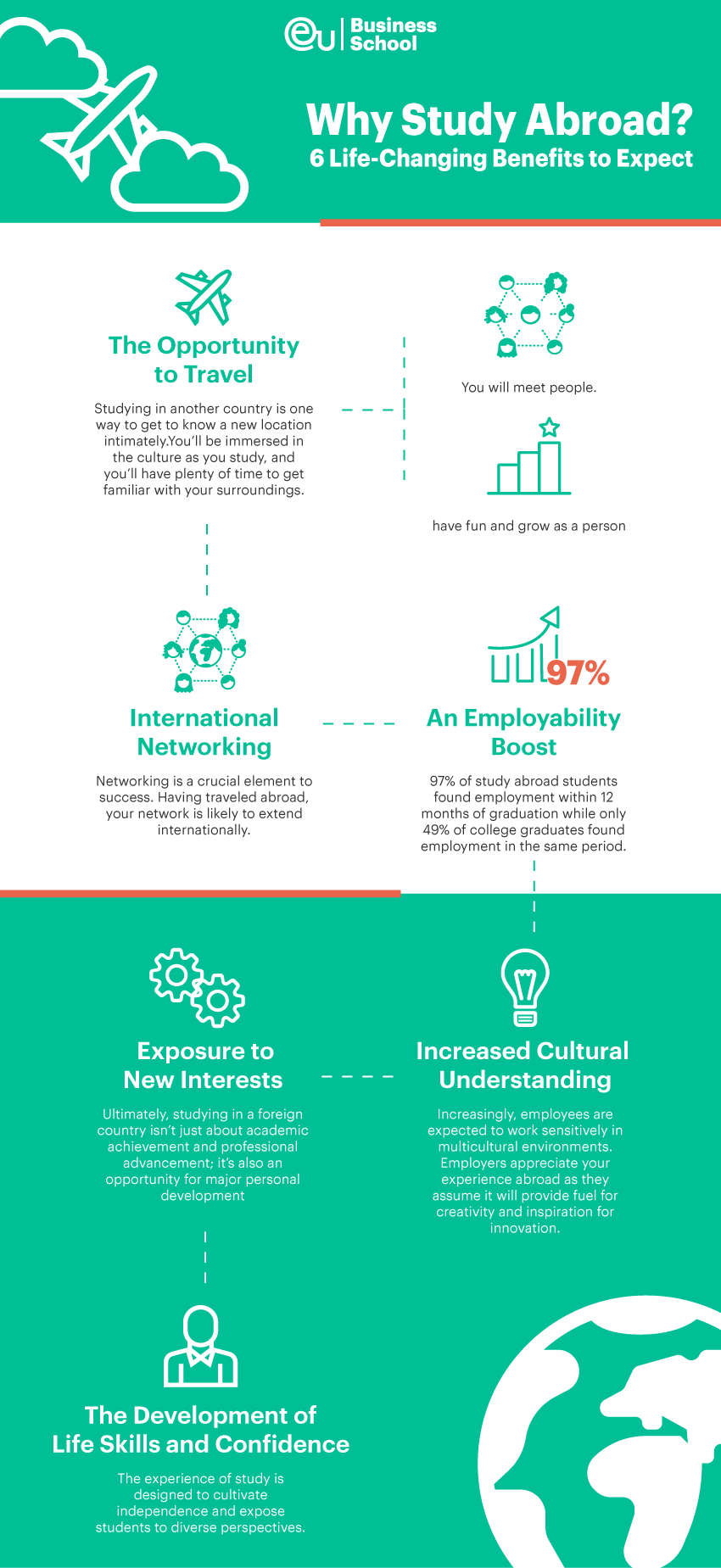Why Study Abroad? 6 Life-Changing Benefits to Expect
For many, the prospect of studying abroad is both intimidating and exhilarating. It combines all the challenges you’d expect from an academic course with the added intrigue of new people, a foreign country and an exotic culture to experience.
More and more people are embracing this opportunity: pre-pandemic, Unesco’s Institute for Statistics found that the number of students choosing to study abroad is increasing by about 12% each year. One reason for this undoubtedly is that it helps graduates stand out in a crowded job market.
However, there are other life-changing benefits, personal and professional, to expect from studying in a foreign country. Here are just six of them.


1. The Opportunity to Travel
This is a bit of an obvious one, but it remains very important. Some students haven’t traveled widely, and they may have a country on their wishlist that they’re desperate to visit. Studying there is one way to get to know a new location intimately.
Even if you’ve been on many vacations, living in a different country for an extended period is a very different experience compared to a week spent at a resort. You’ll be immersed in the culture as you study, and you’ll have plenty of time to get familiar with your surroundings.
Starting to study is always an exciting prospect: alongside academic responsibilities, there’s an expectation that you’ll meet people, try things, have fun and grow as a person. The chance to do all that while simultaneously exploring a new place is a huge draw to many students.
Traveling isn’t just enjoyable; it’s also stimulating and educational. That’s why studying abroad is the ideal set of circumstances for curious minds that are keen to learn.
2. International Networking
While studying abroad, you’ll meet and make connections with people all over the world. That’s fun in the moment but also useful in your later career. As business students know, networking is a crucial element to success. Having traveled abroad, your network is likely to extend internationally.
We live in a context of increasing globalization, and the swing toward remote working has opened up the job market in unprecedented ways. That means your classmate could be the one to put you in touch with your next employer. They may even become your business partner!
When you study abroad, it’s natural to form tight bonds with other foreign students. After all, you’re navigating a new country together as a group. You may find that this leads to professional collaboration long after your graduation date.


3. An Employability Boost
According to research, 59% of employers believe the study abroad experience would be valuable in an individual’s career with their organization. That means employers are likely to respond positively when they see it on your resume. It may be what moves you out of the “maybe” pile and onto the interview shortlist.
Most students study in the hope of finding relevant work afterward. It may inspire them to hear that 97% of study abroad students found employment within 12 months of graduation while only 49% of college graduates found employment in the same period. That’s right; they were almost twice as likely to secure a job.
The benefits continue long after the recruitment period. One recent British study found that study abroad graduates out-earned their peers by 17%. In this difficult economic climate, it seems that studying abroad is one way to make a big impression and kickstart your career.
4. Increased Cultural Understanding
Living in a foreign country is an experience that naturally expands horizons. It exposes you to new cultures and different lifestyles. Employers appreciate this as they assume it will provide fuel for creativity and inspiration for innovation.
Increasingly, employees are expected to work sensitively in multicultural environments. That might be as part of a remote international team or in an office with a diverse department. Exposure to a foreign culture helps to prepare you for this experience.
If you learn or practice a foreign language while you travel, that’s even better! Studies have shown that bilingual employees can earn between 5% and 20% more money per hour than their monolingual peers.
Immersion is a fantastic way to learn a language. Once you’ve mastered it while studying abroad, you’ll also enjoy more employment options. A growing number of positions list second language proficiency as a requirement, so your bilingualism will be attractive to many employers.


5. Exposure to New Interests
Not sure what you want to do post-graduation? Studying abroad may help you find out. One survey found that 34% of study abroad alumni believe their period abroad helped them choose their eventual career field.
It shouldn’t all be work-centered though. Don’t be surprised if you discover a passion you’d never have predicted while studying abroad. The key is to break out of your comfort zone, broaden your horizons and be open to new things, but most people who travel to study have this mindset anyway!
While studying abroad, you might take a dance class and practice the traditional styles of your adopted country. There’s the potential to cook new dishes in their country of origin. The country you’re living in may favor a sport that you’ve never heard of. You could attend a game and realize it’s your new favorite too.
Ultimately, studying in a foreign country isn’t just about academic achievement and professional advancement; it’s also an opportunity for major personal development.
6. The Development of Life Skills and Confidence
The experience of study is designed to cultivate independence and expose students to diverse perspectives. There’s evidence to suggest that the study abroad experience does this to an even greater extent.
A University of Maryland study on IES Abroad study abroad alumni found that 97% of students who studied abroad attributed that experience to their increased maturity.
96% of study abroad alumni said that it helped to increase their confidence.
A German study found that students who studied abroad showed improvements in five core traits: openness, conscientiousness, extraversion, agreeableness and emotional stability. These soft skills can also be transferred to pursue success in the workplace.
You may never have thought about the possibility of studying abroad. However, given the many benefits enjoyed by those who go through this life-changing experience, it may be time to give the idea serious consideration.












